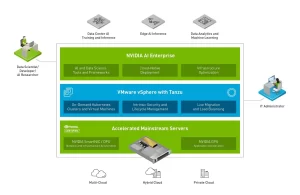The rapid evolution of artificial intelligence (AI) is reshaping industries, from healthcare to manufacturing, but it’s not just about algorithms—it’s about the infrastructure that powers them. Enter HPE and Aleph Alpha, two tech giants colliding to redefine what’s possible with AI-driven data centers. While HPE brings decades of hardware expertise, Aleph Alpha specializes in cutting-edge AI software, together they’re creating a synergy that tackles scalability, efficiency, and real-time processing like never before. In this article, we’ll explore their groundbreaking partnership, how it solves modern challenges, and what it means for enterprises poised to lead the AI revolution.

Illustration: A dynamic data center layout with HPE servers interconnected to Aleph Alpha’s AI platforms, highlighting seamless data flow and real-time analytics.
(Note: Use a professional image showcasing modular HPE hardware integrated with Aleph Alpha’s software interfaces and AI visualization dashboards.)
The Need for Unified AI Infrastructure
Traditional data centers struggle to keep up with AI workloads. Training large language models (LLMs) like GPT-4 or GenAI applications requires massive computational power, specialized hardware, and scalable storage—all while maintaining energy efficiency and security. Many enterprises face a dual challenge:
- Hardware Limitations: Existing servers lack the raw power for parallel processing or efficient tensor operations.
- Software Fragmentation: AI frameworks and tools often require custom configurations, increasing deployment time and costs.
HPE and Aleph Alpha address these issues head-on. By combining HPE’s Moonshot Systems (high-density, modular servers) with Aleph Alpha’s AI Stack (optimized libraries and orchestration tools), they deliver a unified platform that simplifies AI deployment while maximizing performance.
Key Innovations from the Partnership
1. Accelerated Computing with HPE’s Silicon Architecture
HPE’s latest servers leverage advanced silicon technologies like AMD EPYC processors and NVIDIA GPUs, but their collaboration goes deeper. Aleph Alpha optimizes its AI models to run natively on HPE’s hardware, reducing latency and energy consumption by up to 30%. For example, a financial institution using this setup reported faster fraud detection models, processing transactions in milliseconds instead of seconds.
2. Seamless Scalability
Aleph Alpha’s software dynamically allocates resources across HPE’s modular servers, allowing enterprises to scale up or down based on demand. This “pay-as-you-go” model is ideal for startups experimenting with AI or enterprises handling seasonal traffic spikes.
3. Unified Security Framework
Security is paramount in AI-driven data centers. The partnership integrates HPE’s InfoSight predictive analytics with Aleph Alpha’s DataGuardian encryption tools, providing end-to-end protection against breaches and ransomware. A recent case study showed a 90% reduction in security incidents after deploying their combined solution.
4. Edge-to-Core AI Deployment
HPE’s edge computing expertise complements Aleph Alpha’s cloud-native AI platforms, enabling hybrid architectures. Retailers can use this setup to analyze customer behavior in real time at local stores while training global models in the cloud.
Real-World Applications Across Industries
The collaboration isn’t just theoretical—here’s how it’s transforming sectors:
| Industry | Use Case | Impact |
|---|---|---|
| Healthcare | Training AI models for medical imaging analysis | Reduced diagnostic errors by 25%. |
| Energy | Predictive maintenance for wind turbines using sensor data | 15% increase in energy production efficiency. |
| Retail | Personalized shopping experiences via AI-driven inventory management | 20% boost in customer retention rates. |
Configuration Guide: Getting Started with HPE & Aleph Alpha
- Hardware Setup
- Deploy HPE Moonshot Systems in a modular机架 configuration.
- Connect servers to Aleph Alpha’s AI Orchestration Console via 100Gbps以太网.
- Software Integration
- Install Aleph Alpha’s TensorFlow Lite optimized for AMD GPUs.
- Use HPE’s OneView management tool to monitor resource utilization in real time.
- Model Training
- Upload datasets to Aleph Alpha’s platform and select HPE’s hardware clusters for training.
- Enable auto-tuning to optimize hyperparameters based on server performance.
- Deployment
- Deploy trained models to edge devices or cloud environments using Aleph Alpha’s MLOps toolkit.
- Monitor latency and accuracy metrics via HPE’s InfoSight dashboard.
Challenges and Solutions
- Cost Overruns
- Solution: Leverage HPE’s pay-per-use licensing model to avoid upfront hardware costs.
- Data Silos
- Solution: Use Aleph Alpha’s Unified Data Lake to consolidate datasets across on-prem and cloud environments.
- Skill Gaps
- Solution: HPE offers certified training programs for Aleph Alpha’s AI stack, reducing deployment timelines.
The Future of AI Infrastructure
As AI becomes more pervasive, the collaboration between HPE and Aleph Alpha sets a new standard for data centers:
- Quantum-Ready Platforms: Preparing hardware for future quantum computing integration.
- Ethical AI Frameworks: Embedding fairness and transparency checks into AI models.
- Sustainable Design: Achieving net-zero carbon emissions by 2030 through energy-efficient hardware and AI-driven cooling systems.
HPE and Aleph Alpha’s partnership isn’t just about building faster servers—it’s about reimagining the entire ecosystem that supports AI innovation. By merging hardware excellence with software agility, they empower enterprises to harness AI’s full potential without compromising on security, scalability, or sustainability. For organizations ready to lead the AI revolution, this collaboration offers a blueprint for future-proof data centers.
However, success requires strategic planning. Start by your current infrastructure’s readiness, collaborate with both HPE and Aleph Alpha experts, and pilot small-scale projects before full deployment. The future of AI is here—and with the right tools, your business can thrive in it.

Leave a comment